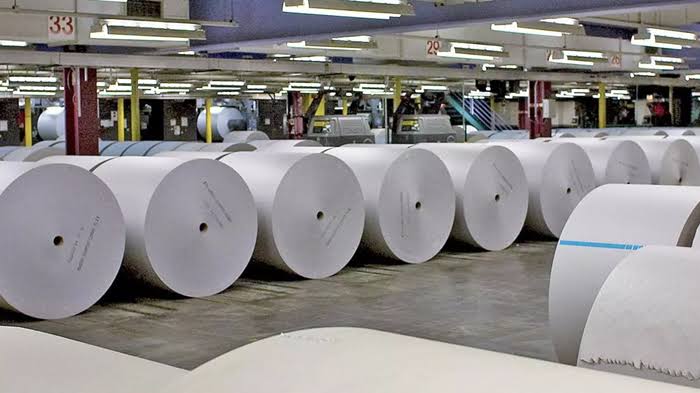Staff Correspondent
Published:2025-05-15 11:23:39 BdST
Local paper industry in perilDuty-free paper imports flood open market
Unscrupulous syndicates are exploiting the duty-free bond facility to import paper under the pretext of printing textbooks and are illegally selling it on the open market.
Although paper imported for textbook printing benefits from duty exemptions as raw material for the printing industry, its open market sale is strictly prohibited by the government.
Nevertheless, in pursuit of higher profits, these groups have continued to flout the ban, posing a grave threat to the survival of the domestic paper industry.
This abuse of import privileges not only leads to significant outflows of foreign currency but also results in massive revenue losses for the government.
In light of these concerns, the Bangladesh Paper Mills Association (BPMA) has submitted a formal proposal to the Chairman of the National Board of Revenue (NBR), urging the withdrawal of duty exemptions on such imports.
In a prior appeal to the Education Adviser, the association highlighted that despite having higher production capacity than the domestic demand, local paper mills are being threatened by the influx of duty-free imported paper into the open market.
Accordingly, BPMA has called for the cancellation of the current duty exemption facility on paper imported for textbook printing.
In its letter to the NBR, the association specifically requested action against the sale of duty-free imported paper in open markets in violation of special import conditions for the 2025 academic year's textbook printing.
It was further informed that a rogue business entity named Union Associates, in collusion with a powerful vested interest, has sold duty-free imported paper—intended for textbooks—at inflated prices in the open market. Instead of supplying 7,750 metric tonnes of paper to authorised printing houses, the firm diverted the shipment to other entities to maximise profits.
In fact, the actual import volume is believed to be higher than the declared 7,750 metric tonnes.
The syndicate has not only violated special duty-free import terms but has also defrauded the government of substantial revenue.
The BPMA also noted that local mills are fully capable of supplying paper in line with the National Curriculum and Textbook Board’s (NCTB) specifications. Despite this, unethical practices continue under the cover of the duty-free scheme, posing an existential threat to Bangladesh's paper industry.
The association warned that unless this harmful conspiracy to destroy the domestic industry is stopped immediately, others may soon follow suit.
The BPMA demanded a thorough investigation, legal action against those involved, and full recovery of lost revenue and penalties for misusing the duty-free import facility.
Before approaching the NBR, the industry group also informed the Education Adviser of the situation.
In another letter to the Ministry of Education, BPMA called for a complete halt to the duty-free import of printing paper. Local entrepreneurs in the sector have expressed deep concern over the exemption of Customs Duty (CD) and Regulatory Duty (RD) on printing paper used in textbook production.
They allege that unscrupulous traders are misusing the facility, much like the bond scheme, in collusion with influential players. Amid a global economic downturn, these groups are trying to dismantle the already fragile domestic paper industry. Paper imported under duty-free provisions is already being sold on the open market, and such abuse is feared to continue. If this unjust facility persists, the domestic industry could collapse entirely.
The association further stated that the paper industry in Bangladesh is recognised as an import-substitute, export-oriented, and environmentally friendly sector. Out of 128 registered mills, 106 are operational with a combined annual capacity of 1.6 million metric tonnes. Of this, 0.9 million tonnes meet local demand, while the surplus is exported to over 40 countries, generating valuable foreign exchange. The industry directly employs 2.5 million people and supports the livelihoods of 10 million more indirectly. Investors have poured nearly Tk1 trillion into the sector, and over 300 ancillary industries have emerged around it. The paper sector contributes approximately Tk50 billion in annual revenue and significantly saves foreign exchange as an import-substitute industry.
Despite its long-standing presence, the domestic paper industry continues to stumble due to the dishonest practices of vested interest groups. At present, it is facing a critical crisis. These dishonest traders and vested interests are exploiting the existing liberal policies by abusing bond facilities, submitting false declarations, and engaging in smuggling to import large quantities of paper, endangering the industry's existence.
Already, 80 paper mills have been shut down completely, and the remaining 26 are barely managing to operate.
It is important to note that BPMA member mills are capable of supplying NCTB-specified quality paper at fair prices and on time. For the past 20 years, these local mills have consistently delivered paper that meets all NCTB standards. Yet, printing contractors awarded orders by NCTB are opting to import duty-free paper instead of purchasing from domestic sources. This decision by NBR has proven to be suicidal for the local industry.
Moreover, local mills are subject to VAT and advance income tax when supplying paper to NCTB. In contrast, duty-free imports have created a sharp disparity between local and foreign paper.
Given this scenario, industry stakeholders are demanding the withdrawal of duty and VAT exemptions on imported paper to safeguard the existence of the local industry, its 300-plus supporting industries, and Tk1 trillion in investments that contribute to the nation’s socioeconomic development.
It should be noted that in February this year, import duties of 25 percent and regulatory duties of 3 percent on paper were conditionally waived. However, many beneficiaries of this waiver are not adhering to the stipulated conditions.
Unauthorized use or reproduction of The Finance Today content for commercial purposes is strictly prohibited.


